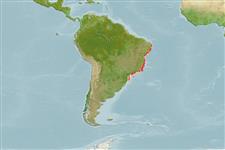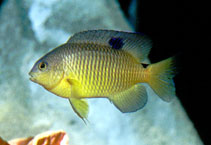Stegastes variabilis (Castelnau, 1855)
Cocoa damselfish
Add your observation in Fish Watcher
| Native range | All suitable habitat | Point map | Year 2050 |

|
| This map was computer-generated and has not yet been reviewed. |
| Stegastes variabilis AquaMaps Data sources: GBIF OBIS |
Upload your photos and videos
Pictures | Stamps, coins, misc. | Google imageStegastes variabilis
Picture by Luiz, Jr., O.
Pictures | Stamps, coins, misc. | Google imageStegastes variabilis
Picture by Luiz, Jr., O.
Classification / Names Common names | Synonyms | Catalog of Fishes(genus, species) | ITIS | CoL | WoRMS | Cloffa
Teleostei (teleosts) > Ovalentaria/misc (Various families in series Ovalentaria) > Pomacentridae (Damselfishes) > Microspathodontinae
Etymology: Stegastes: Greek, stegastos, -e, -on = covered (Ref. 45335).
More on author: Castelnau.
Etymology: Stegastes: Greek, stegastos, -e, -on = covered (Ref. 45335).
More on author: Castelnau.
Environment: milieu / climate zone / depth range / distribution range Ecology
Marine; reef-associated; non-migratory; depth range 0 - 30 m (Ref. 7247). Tropical; 6°S - 30°S, 50°W - 31°W
Distribution Countries | FAO areas | Ecosystems | Occurrences | Point map | Introductions | Faunafri
Western Atlantic: Brazil. Caribbean (described from Cuban specimens) species refers to Stegastes xanthurus (formerly considered as a junior synonym of S. variabilis). Populations from Brazil and the Caribbean are genetically very distinct (Roberstson & van Tassell, 2012; accessed 08 August 2016; http://biogeodb.stri.si.edu/caribbean/en/thefishes/species/3884).
Size / Weight / Age
Short description Identification keys | Morphology | Morphometrics
Dorsal spines (total): 12; Dorsal soft rays (total): 14 - 17; Anal spines: 2; Anal soft rays: 12 - 15. Caudal fin slightly forked, with rounded lobes. Dark brown or blue above, shading to yellow below. Narrow, dark, obliquely vertical lines on side. Snout and forehead have bright blue lines. Small dark spot in pectoral axil, another on top of caudal peduncle (Ref. 26938).
Adults inhabit inshore and offshore coral reefs. They feed mainly on benthic algae but also on sponges, ascidians and anemones while juveniles feed on invertebrates like harpacticoid copepods and nemerteans (Ref. 9626). Often solitary (Ref. 9626). Juveniles are aggressively territorial (Ref. 9626). Aggressive when breeding (Ref. 9710). Oviparous, distinct pairing during breeding (Ref. 205). Eggs are demersal and adhere to the substrate (Ref. 205). Males guard and aerate the eggs (Ref. 205). Taken incidentally in traps and small-meshed beach nets (Ref. 5217).
Life cycle and mating behavior Maturity | Reproduction | Spawning | Eggs | Fecundity | Larvae
Oviparous, distinct pairing during breeding (Ref. 205). Eggs are demersal and adhere to the substrate (Ref. 205). Males guard and aerate the eggs (Ref. 205).
Main reference
Upload your references | References | Coordinator : Allen, Gerald R. | Collaborators
Allen, G.R., 1991. Damselfishes of the world. Mergus Publishers, Melle, Germany. 271 p. (Ref. 7247)
IUCN Red List Status (Ref. 130435: Version 2024-2)
Least Concern (LC) ; Date assessed: 04 October 2021
CITES
Not Evaluated
Threat to humans
Harmless
Human uses
Fisheries: commercial; aquarium: commercial
FAO - Publication: search | FishSource |
More information
Trophic ecology
Food items
Diet composition
Food consumption
Food rations
Predators
Food items
Diet composition
Food consumption
Food rations
Predators
Ecology
Ecology
Ecology
Population dynamics
Growth parameters
Max. ages / sizes
Length-weight rel.
Length-length rel.
Length-frequencies
Mass conversion
Recruitment
Abundance
Growth parameters
Max. ages / sizes
Length-weight rel.
Length-length rel.
Length-frequencies
Mass conversion
Recruitment
Abundance
Life cycle
Reproduction
Maturity
Maturity/Gills rel.
Fecundity
Spawning
Spawning aggregations
Eggs
Egg development
Larvae
Larval dynamics
Reproduction
Maturity
Maturity/Gills rel.
Fecundity
Spawning
Spawning aggregations
Eggs
Egg development
Larvae
Larval dynamics
Anatomy
Gill area
Brain
Otolith
Gill area
Brain
Otolith
Physiology
Body composition
Nutrients
Oxygen consumption
Swimming type
Swimming speed
Visual pigments
Fish sound
Diseases & Parasites
Toxicity (LC50s)
Body composition
Nutrients
Oxygen consumption
Swimming type
Swimming speed
Visual pigments
Fish sound
Diseases & Parasites
Toxicity (LC50s)
Genetics
Genetics
Heterozygosity
Heritability
Genetics
Heterozygosity
Heritability
Tools
Bio-Quiz | E-book | Field guide | Length-frequency wizard | Life-history tool | Point map | Classification Tree
| Catch-MSY |
Special reports
Download XML
Internet sources
AFORO (otoliths) | Aquatic Commons | BHL | Cloffa | BOLDSystems | Websites from users | Check FishWatcher | CISTI | Catalog of Fishes: genus, species | DiscoverLife | ECOTOX | FAO - Publication: search | Faunafri | Fishipedia | Fishtrace | GenBank: genome, nucleotide | GloBI | GoMexSI (interaction data) | Google Books | Google Scholar | Google | IGFA World Record | MitoFish | Otolith Atlas of Taiwan Fishes | Public aquariums | PubMed | Reef Life Survey | Socotra Atlas | Tree of Life | Wikipedia: Go, Search | World Records Freshwater Fishing | Zoological Record
Estimates based on models
Preferred temperature (Ref. 123201): 22.5 - 27.5, mean 25.9 °C (based on 139 cells).
Phylogenetic diversity index (Ref. 82804): PD50 = 0.5000 [Uniqueness, from 0.5 = low to 2.0 = high].
Bayesian length-weight: a=0.01660 (0.00919 - 0.02998), b=2.99 (2.83 - 3.15), in cm total length, based on LWR estimates for this species & Genus-body shape (Ref. 93245).
Resilience (Ref. 120179): High, minimum population doubling time less than 15 months (Preliminary K or Fecundity.).
Fishing Vulnerability (Ref. 59153): Low vulnerability (10 of 100).
Nutrients (Ref. 124155): Calcium = 103 [52, 161] mg/100g; Iron = 0.741 [0.459, 1.216] mg/100g; Protein = 18.1 [17.0, 19.3] %; Omega3 = 0.11 [0.07, 0.18] g/100g; Selenium = 25.1 [13.9, 46.7] μg/100g; VitaminA = 81.5 [21.8, 278.2] μg/100g; Zinc = 1.75 [1.19, 2.54] mg/100g (wet weight);




